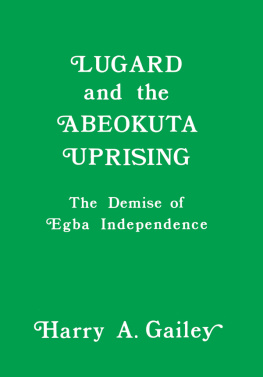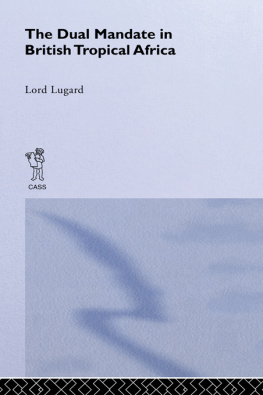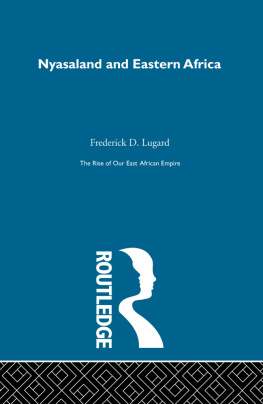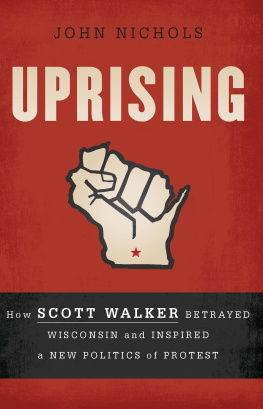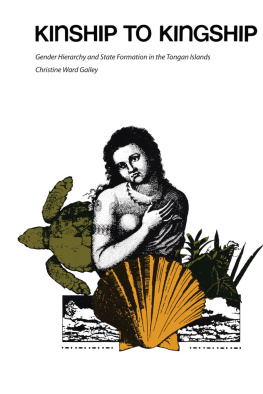First published 1982 by Frank Cass and Company Limited
Published 2013 by Routledge
2 Park Square, Milton Park, Abingdon, Oxon 0X14 4RN
711 Third Avenue, New York, NY 10017, USA
Routledge is an imprint of the Taylor & Francis Group, an informa business
Copyright 1982 Harry A. Gailey
Typeset by Computacomp (UK) Ltd,
Fort William, Scotland,
All Rights Reserved. No part of this publication may be reproduced by any means, electronic, mechanical, photocopying, recording or otherwise without the prior permission of Frank Cass and Company Limited in writing.
British Library Cataloguing in Publication Data
Gailey, Harry Alfred
Lugard and the Abokuta uprising.
1. gba (African tribe) History 2. Lugard, Frederick John Dealty, Baron Lugard 3. Nigeria Politics and government 4. Great Britain Colonies Nigeria Administration
I. Title
966.92004963 DT515.7
ISBN 978-0-714-63114-1 (hbk)
An author should have some compelling reason for writing any book and he owes the reader at least a partial exposition of these. When one re-examines a portion of the career of someone as important as Lord Lugard, then an explanation is even more necessary than otherwise. On one level this short work is a continuation of the authors interest in British colonial administration in West Africa during the twentieth century. There is so much work yet to be done in this area of imperial history that no further justification for this present study need be offered. However, my view of Lugard and his gba policy is different enough from the standard version of his career that some further statement seems warranted. Anyone concerned with the broad subject area of modern African history will encounter the reality and myth of Lugards contributions. Twenty years ago Lugard appeared to most students of imperial history not only as a successful military leader and diplomat but also as an administrative innovator. The system of administration entitled Indirect Rule appeared to have been specifically devised by Lugard first to meet the needs of governing Northern Nigeria and then successfully adapted to the south and eventually to most of British Africa.
The authors change of attitude toward Lord Lugard came slowly. It began long ago with more detailed investigations of Nigerian history and reading critiques of British policy such as bafmi Awolws Path to Nigerian Freedom. Despite some doubts that Lugard was as successful as reported, I was genuinely shocked by the vehemence of the late Nigerian Federal Archivist, L. C. Gwam, when discussing Lugard. Among other works he had planned before his death was a book which would have been an expos of Lugards mistaken policies as applied to western Nigeria. Other researchers into the administrative history of Nigeria also tended to echo the charge that Lugard had not understood the African societies and had forced an alien system of rule upon them. In my own research and writing in the 1960s I discovered further evidence to support such a contention. In The Road to Aba I explored the Lugard policy toward taxation which eventually culminated in the womens disturbances in eastern Nigeria. Collecting the data for this book impelled me to begin a more serious investigation of Sir Donald Cameron. Eventually I wrote a political biography of this fine administrator. One of the major points of that work was that Cameron, far from being a disciple, had disagreed vehemently with much that Lugard had done in Nigeria. The most significant contribution Lugard made to Camerons concept of Native Administration was a negative one. He had learned what not to do. Cameron stated many times that Sir Hugh Clifford, not Lugard, had been his mentor.
At this stage of my own reinterpretation of Lord Lugardfc administration there appeared a number of other books which publicly questioned his policies. Chief among these was I. F. Nicolsons The Administration of Nigeria, 19001960. This excellent, well-documented work stated in unequivocal terms Lugards errors in Nigeria and how these were hidden from the public at the time that the Lugard myth was being developed. Although ignoring many of the governor-generals problems and his many contributions, the book, nevertheless, was a good assessment of Lugards administration of Nigeria. Other Nigerian historians such as J. C. Anene, Tekena Tamuno, and A. E. Afigbo in their specialized studies have agreed with Nicolson and confirmed my own changed attitude toward Lord Lugard.
In any work on the modern political development of Nigeria the name Abokuta will appear. In most of these books a paragraph or at most a page will state in the barest fashion the outline of the British annexation and administration culminating in the 1918 gba uprising. The more familiar one becomes with Nigerian history, the more unsatisfactory are the published accounts of these events. I could not understand why no one had investigated more thoroughly the background and course of the Abokuta disturbance since it seemed obvious that this was the greatest failure of Lugards administration. Here Lugards entire policy was thrown into sharp relief against the traditional values of the gba and Owu people. They had violently rejected Lugards concepts and over five hundred persons had paid with their lives for their action. Three years ago I determined to look more thoroughly into the Abokuta affair. The following book is the result of those researches.
Some time ago in a discussion with me, Dame Margery Perham voiced a fear of what I would do in such a study to Lord Lugard. I hope that this book will allay her fears. For her and other admirers of Lord Lugard I should like at the very beginning of this work to make my attitude-very clear. Lord Lugard achieved much, but he was not the Bayard of the Colonial Service as many observers believed. He was a military officer, inured to hardships, cool, and level headed, one who could make decisions swiftly and at times with a gamblers vision. Against great odds he was instrumental in adding Uganda and Northern Nigeria to the British Empire. These conquests represent his great contribution. However, he is as remembered for his administrative ability as for his conquests and this is where the myth does an injustice to imperial history. The ad hoc administrations established for the Hausa-Fulani and Kanuri areas of Nigeria, while functioning admirably, were no different in concept from those being accepted at the time by other British administrators elsewhere in Africa as a pragmatic solution to the governance of large areas. There is much evidence to show that Lugard, although a tireless worker, was only a mediocre administrator, consistently ignoring his most able assistants and failing to build an adequate structure of government for Nigeria. He had a special status within the Colonial Service and whether he consciously took advantage of his position or not, the results were the same. Few of his subordinates would chance an end to their careers by espousing a point of view at variance with Lugard. The amalgamation of Nigeria was an example of this as was the introduction of the northern model of rule and taxation to the south.
I am not concerned with denigrating Lord Lugard, but only with restoring a sense of perspective to his government of Nigeria. Abokuta was one point where the people repudiated Lugard. It seemed fruitful to explore his policies toward the gba in order to understand why many gba and Owu people were prepared to die rather than accept his vision of the future. It was necessary in this book, in order to make sense of Lugards administration in gbaiand, to devote considerable space to the history, religion, and political structure created by the African peoples of western Nigeria. Only by looking at the gba traditional system and their attempts to modernize their state prior to 1914 can one fully appreciate their sense of loss and betrayal after annexation. The Abokuta uprising was a very important event during the imperial phase of Nigerian history. Its story needed to be told. I hope in some measure I have done justice to the subject.

